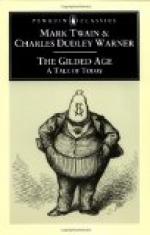“Indeed he was. He was ex-officio Indian agent, too. Many a man would have taken the Indian appropriation and devoted the money to feeding and clothing the helpless savages, whose land had been taken from them by the white man in the interests of civilization; but Balloon knew their needs better. He built a government saw-mill on the reservation with the money, and the lumber sold for enormous prices—a relative of his did all the work free of charge—that is to say he charged nothing more than the lumber world bring.” “But the poor Injuns—not that I care much for Injuns—what did he do for them?”
“Gave them the outside slabs to fence in the reservation with. Governor Balloon was nothing less than a father to the poor Indians. But Balloon is not alone, we have many truly noble statesmen in our country’s service like Balloon. The Senate is full of them. Don’t you think so Colonel?”
“Well, I dunno. I honor my country’s public servants as much as any one can. I meet them, Sir, every day, and the more I see of them the more I esteem them and the more grateful I am that our institutions give us the opportunity of securing their services. Few lands are so blest.”
“That is true, Colonel. To be sure you can buy now and then a Senator or a Representative but they do not know it is wrong, and so they are not ashamed of it. They are gentle, and confiding and childlike, and in my opinion these are qualities that ennoble them far more than any amount of sinful sagacity could. I quite agree with you, Col. Sellers.”
“Well”—hesitated the, Colonel—“I am afraid some of them do buy their seats—yes, I am afraid they do—but as Senator Dilworthy himself said to me, it is sinful,—it is very wrong—it is shameful; Heaven protect me from such a charge. That is what Dilworthy said. And yet when you come to look at it you cannot deny that we would have to go without the services of some of our ablest men, sir, if the country were opposed to —to—bribery. It is a harsh term. I do not like to use it.”
The Colonel interrupted himself at this point to meet an engagement with the Austrian minister, and took his leave with his usual courtly bow.
CHAPTER XXXVI.
In due time Laura alighted at the book store, and began to look at the titles of the handsome array of books on the counter. A dapper clerk of perhaps nineteen or twenty years, with hair accurately parted and surprisingly slick, came bustling up and leaned over with a pretty smile and an affable—
“Can I—was there any particular book you wished to see?”
“Have you Taine’s England?”
“Beg pardon?”
“Taine’s Notes on England.”
The young gentleman scratched the side of his nose with a cedar pencil which he took down from its bracket on the side of his head, and reflected a moment:
“Ah—I see,” [with a bright smile]—“Train, you mean—not Taine. George Francis Train. No, ma’m we—”




